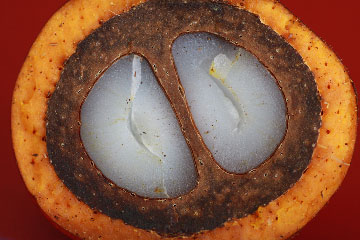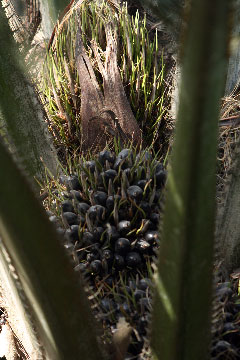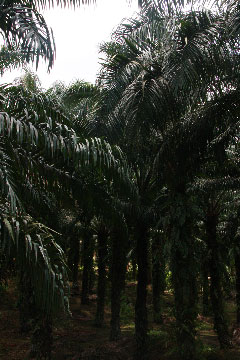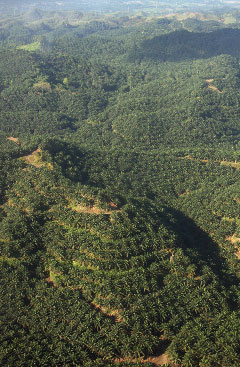Malaysian palm oil industry puts sustainability in the spotlight
Malaysian palm oil industry puts sustainability in the spotlight
Rhett Butler, mongabay.com
April 17, 2008
Seeking to differentiate its palm oil from that produced less responsibly in other countries, the Malaysian Palm Oil Council (MPOC) sponsored a three-day meeting this week in Kota Kinabalu, on the island of Borneo.
The International Palm Oil Sustainability Conference (IPOSC) aimed to promote the virtues of palm oil and address environmental concerns that many green groups say plague the industry.
“Sustainability is the single most important challenge or threat as one chooses to see it,” said Dato’ Seri Lee Oi Hian, chairman of MPOC. “This is the reason that the MPOC has launched the IPOSC.”
“Sustainable palm oil is now a business requirement, which no company can overlook,” he continued. “The IPOSC reflects on the environmental and sustainabilty issues in the industry and what we can do to further improve the situation.”
Malaysian palm oil seeks market recognition for environmental efforts

Oil palm seed. Photo by Rhett A. Butler |
Datuk Peter Chin Fah Kui, Minister of Plantation Industries and Commodities for Malaysia, highlighted some of the key areas that the MPOC feels have been overlooked or misrepresented by environmental groups, including carbon emissions, governance, and use of pesticides and fertilizers.
Chin said that as a perennial tree crop with an economic life of 30 years, oil palm stores more carbon that other oilseeds, notably soy and rapeseed. Further, as the world’s most productive oilseed, palm oil does more to feed the world per unit of area than any other crop. He noted that contrary to public perception, most palm oil goes to food production rather than biofuels.
The minister said recent attacks by European NGOs on the carbon balance of palm oil were unfair to Malaysia, suggesting that European production of rapeseed and other crops generated greater emissions than responsibly produced palm oil. He also noted that Europe had destroyed the vast majority of its forests.

Oil palm fruits Oil palm trees
|
Chin claimed that most oil palm plantations in Malaysia have been established on previously logged lands and areas formerly used for other types of plantations, like rubber and cacao. Unlike Indonesia, oil palm in Malaysia is today only established in legally sanctioned areas, he said. He alleged that NGOs have overstated biodiversity loss resulting from the establishment of plantations.
Chin discussed some of the environmentally-friendly initiatives of the industry including a zero burning policy, utilization of waste (palm branches are used as organic fertilizer), treatment of wastewater, and integrated pest management to reduce the need for pesticides by using natural predators like owls, snakes, and insects to control pests.
Chin also announced the official launch of the RM20 million ($6.4 million) Malaysian Palm Oil Wildlife Conservation Fund to sponsor studies on wildlife, oil palm and the environment. Half the fund will come from Malaysian palm oil firms; the other half is a grant from the Malaysian government. Chin mentioned the Borneo Conservation Trust, a project that seeks verify the number of orangutans in Sabah. Presently it is believed there are some 12,000 orangutans in the state, a steep drop since 1950.
Controversies
While many of the speakers portrayed the palm oil industry in a positive light with regards to its environmental performance, a few presenters took exception to some claims, notably the impact of oil palm on biodiversity loss and deforestation, the virtue of converting peatlands for oil palm, and the behavior of Malaysian firms operating outside of Malaysia.
Dr. David Wilcove, a professor at Princeton, said there is no question that oil palm plantations are biologically impoverished relative to natural forest, even when it has been logged. Darrel Webber of WWF-Malaysia said that extensive areas of healthy forests have been transformed into oil palm plantations since the early 1980s and expressed concern that high palm oil prices and lack of suitable land for oil palm cultivation in Sabah will increased development pressure on the Malaysian state’s forest reserves. A member of the Borneo Orangutan Society accused the MPOC of portraying orangutan populations as being healthier than they really are and said the industry’s RM10 million ($3.2 million) will not be enough to have much of an impact on the endangered apes.
Another source of controversy was whether tropical peatlands can be developed safely for oil palm cultivation. While Dr. S. Paramanathan of Param Agricultural Soil Surveys said that emissions from conversion are often overstated by environmental groups who fail to accurately sample peat soils, he conceded that until more is known about the carbon impact of peatlands conversion, peat should be treated as a “problem soil.” One audience member proposed a ban until it is determined whether peatlands can be converted for agriculture without significant greenhouse gas emissions. Paramanathan said the Malaysian government should carry out a full inventory of all the country’s peatlands.
The environmental performance of Malaysian-run plantations in Kalimantan and Sumatra was also a concern. Sarala Aikanathan of Wetlands International suggested a double standard among Malaysian plantation operators: they follow the rules in Malaysia, but jettison them in Indonesia where law enforcement is lax and more forest is available for the taking. She added that European consumers are sincere about green energy and that Malaysia could gain by improving the sustainability of the palm oil industry.
Presenters
Other presenters included representatives from Sime Darby, SIRIM Berhad, Wilmar International Limited, IOI Corporation, AES AgriVerde Services, Hart Energy Consulting, the Sarawak Department of Agriculture, the Malaysian Palm Oil Board, Universiti Malaysia Sabah, PERHILITAN, the Borneo Conservation Trust, CarbonCapital Solutions, and Petronas, Malaysia’s national oil company.









